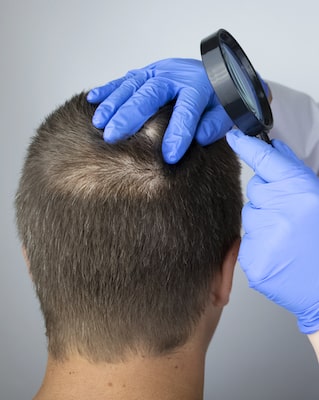FDA Approval for New Treatment of Alopecia Areata – Details Here
Alopecia Areata (AA) can cause hair loss on every part of the skin of a person. It is an autoimmune disease that impacts both male and female patients by creating a patchy appearance on the scalp where a person is experiencing a lack of hair. In general, the patchy areas are round in shape, and they are normally about the size of a coin.
Since alopecia areata is classified as an autoimmune disease, this means the person with the condition has an autoimmune system that mistakes the hair follicles as being foreign objects in the body. The white blood cells in the body work to protect the body from what it views as foreign objects, so the hair falls out and this creates the bald patches on the scalp.
Once the autoimmune disease subsides, the hair follicles that have been affected by the condition are capable of producing a normal amount of hair growth on the scalp. Until now, there has not been any type of systemic treatment for alopecia areata. The only effective treatment has been the injection of steroids into the lesions located on the scalp. Unfortunately, this is not always an easy to perform treatment due to the fact that alopecia areata can impact multiple areas of the skin and scalp.
Thankfully, the FDA came out with news earlier this month regarding oral tablets for the use of treating patients who are suffering from a severe case of alopecia areata. This new medication appears to be most effective when it comes to treating extensive types of the condition including alopecia totalis and alopecia universalis which involve hair loss on the entire head as well as the entire body.
A Look at the New FDA Approved Treatment for Alopecia Areata
 On June 13th of this year, the U.S. Food and Drug Administration approved the use of Olumiant (baricitinib) oral tablets for the treatment of adult patients suffering from severe alopecia areata. The approval of the medication for this purpose is the first time the FDA has approved a systemic treatment (which means it treats the entire body as opposed to one specific location) for the condition of alopecia areata.
On June 13th of this year, the U.S. Food and Drug Administration approved the use of Olumiant (baricitinib) oral tablets for the treatment of adult patients suffering from severe alopecia areata. The approval of the medication for this purpose is the first time the FDA has approved a systemic treatment (which means it treats the entire body as opposed to one specific location) for the condition of alopecia areata.
In a press release to mark the occasion, Kendall Marcus, M.D., the director of the Division of Dermatology and Dentistry in the FDA’s Center for Drug Evaluation and Research, said, “Access to safe and effective treatment options is crucial for the significant number of Americans affected by severe alopecia. Today’s approval will help fulfill a significant unmet need for patients with severe alopecia areata.”
The condition of alopecia areata can be treated with Olumiant which is a Janus kinase (JAK) inhibitor, and this means it blocks the activity of one member (or multiple members) of a specific family of enzymes so there is interference with the pathway that leads to inflammation on the scalp.
Olumiant Trials – See the Results
Both the efficacy and safety of Olumiant in relation to the treatment of alopecia areata was studied in two randomized, placebo-controlled, double-blind trials. The patients who took part in the two studies had at least a 50% amount of hair loss for more than six months. The determination of the hair loss severity was made through a measurement of the hair loss using the Severity of Alopecia Tool.
The patients who were part of the trial received, on a daily basis, either two or four milligrams of Olumiant or they received a placebo. The research team established the primary measurement of efficacy for both of the trials as the proportion of patients who achieved an amount of scalp hair coverage that was at least 80% by week thirty-six of the trials.
The results of the trials were as follows:
- In Trial AA-1, a total of 22% of the 184 patients who received two milligrams of Olumiant achieved an adequate amount of scalp hair coverage. Of the patients who received four milligrams of Olumiant during the trial, 35% of the 281 patients achieved an adequate amount of scalp hair coverage. These results are in comparison to the 5% of the 189 patients who received a placebo.
- In Trial AA-2, the results showed a total of 17% of the 156 patients who received two milligrams of Olumiant received adequate scalp hair coverage. Of the patients who received four milligrams of Olumiant, 32% of the 234 patients achieved an adequate amount of scalp hair coverage. These results are compared to the 3% of the 156 patients who received a placebo during the trial.
Olumiant Side Effects and Warning
There are some common side effects associated with the use of Olumiant and some of them include headache, upper respiratory tract infections, high cholesterol, liver enzyme elevations, hair follicle inflammation (folliculitis), anemia, shingles, and an increase in weight.
Olumiant comes with a boxed warning on its packaging and the issues listed in the warning include (among others) serious infection, major adverse cardiovascular events, and thrombosis.
Olumiant received both a breakthrough therapy designation and a priority review designation for this indication. The approval of Olumiant by the FDA was granted to Eli Lilly and Company.